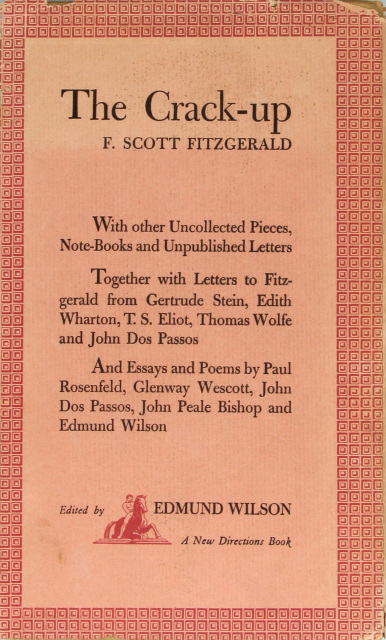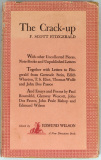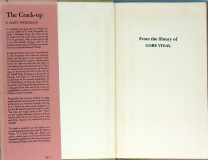- Literary
- >
- F. Scott Fitzgerald, The Crack-up, Ex Libris Gore Vidal
F. Scott Fitzgerald, The Crack-up, Ex Libris Gore Vidal
SKU:
$175.00
$175.00
Unavailable
per item
[Ex Libris Gore Vidal] Fitzgerald, F. Scott. The Crack-up. First Edition. 1945. Book and dust jacket are both in very good condition—jacket shows a few tiny chips. Book is stamped “From the library of GORE VIDAL” on the flyleaf. It is also embossed “Edgewater, Tarrytown on Hudson, New York.” [Edgewater was Vidal’s upstate New York residence, which he sold in 1969.]
Is it possible for debauchery to reach heroic proportions? In the case of F. Scott Fitzgerald, perhaps yes. It was the exuberance and excesses of Scott and his wife Zelda that made them so emblematic of the Jazz Age. How profound they came crashing to earth at the same time their era did. Within a year of the Great Depression, she was in a mental hospital, and he was coming to grips with an alcoholism that would precipitate irreversible mental and physical decline. One means by which Fitzgerald came to grips with his fate was a story about it. He chronicled his decline in “The Crack-up,” which appeared in Esquire and, five years after his death, was collected into this book, along with other authorial notes and autobiographical writings. This copy was in the collection of Gore Vidal, and as such was possibly used as reference when Vidal wrote about Fitzgerald in 1980 for the New York Review of Books.
“The test of a first-rate intelligence is the ability to hold two opposed ideas in the mind at the same time, and still retain the ability to function.”
--F. Scott Fitzgerald
Is it possible for debauchery to reach heroic proportions? In the case of F. Scott Fitzgerald, perhaps yes. It was the exuberance and excesses of Scott and his wife Zelda that made them so emblematic of the Jazz Age. How profound they came crashing to earth at the same time their era did. Within a year of the Great Depression, she was in a mental hospital, and he was coming to grips with an alcoholism that would precipitate irreversible mental and physical decline. One means by which Fitzgerald came to grips with his fate was a story about it. He chronicled his decline in “The Crack-up,” which appeared in Esquire and, five years after his death, was collected into this book, along with other authorial notes and autobiographical writings. This copy was in the collection of Gore Vidal, and as such was possibly used as reference when Vidal wrote about Fitzgerald in 1980 for the New York Review of Books.
“The test of a first-rate intelligence is the ability to hold two opposed ideas in the mind at the same time, and still retain the ability to function.”
--F. Scott Fitzgerald
Sold Out





